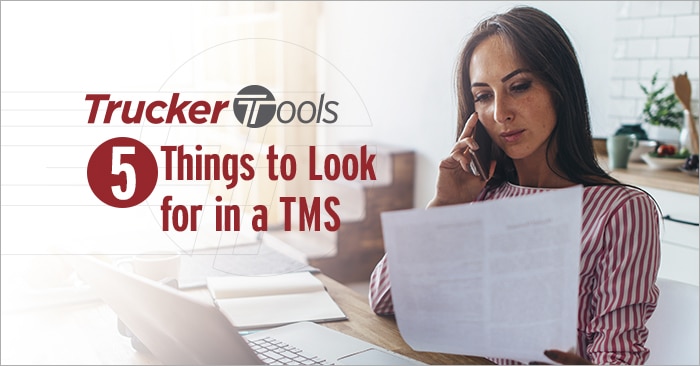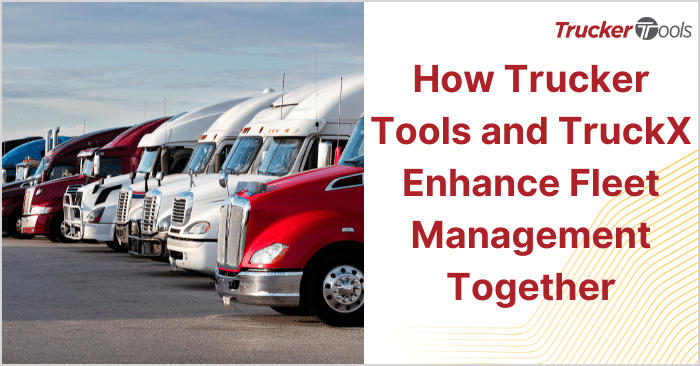When you’re shopping for a new transportation management system for your freight brokerage or logistics business, it’s important to consider how the TMS’ features and tools align with your current operations. You’ll want to choose a TMS that automates some of your internal procedures and processes, while feeding your team real-time information that can help that team make better business decisions faster. There are several features that you should look for in a TMS that go beyond basic functionality and useability. It’s important also to consider the TMS’ integration capabilities, scalability, whether it’s cloud-based or hosted on-site, customization options and whether the TMS provider is a good fit for your company for the long-term.
1. Integration Capabilities
Before you commit to a new TMS, it’s crucial to determine whether the software you may be buying can be easily integrated with other technologies you currently use or may want to use in the future. Software platform integrations allow your team members to access the data they need within the TMS, instead of needing to open a new application or browser to get the information they need. Integrations allow data-sharing across platforms, which means your data and systems aren’t siloed. The data-sharing facilitated by platform integrations can help you locate inefficiencies and bottlenecks, identify top internal and carrier performers, and gain a better understanding of how your business operates. Trucker Tools’ Smart Capacity platform notably integrates with the most popular TMSs in use today.

2. Scalability
It is equally important to look for a TMS that is scalable. When a TMS is scalable, “it doesn’t need to be redesigned to maintain effective performance during or after a steep increase in workload.” In plain terms, if a TMS is scalable, it means you can continue using it even if your business volume increases or decreases. We all know that freight markets and the transportation business in general can be volatile. Choosing a scalable TMS ensures that you won’t have to buy an entirely new TMS if your load volume waxes and wanes. Scalability provides you with the flexibility to grow or shrink your business without being limited by the structure of the TMS. If you don’t choose a scalable TMS, the software may not be able to fully accommodate a higher workload, which can mean slow load times and missing data.
3. Easy Remote Access
Even though the COVID-19 pandemic is nearly two years old, your employees may still be working remotely or your team may be fully remote permanently. If you want the flexibility of remote access, look for a TMS that is cloud-based. A cloud-based server hosts the TMS and its data offsite, usually through a third-party provider. A cloud-based TMS can be beneficial because it can be accessed from anywhere with a web browser and an Internet connection. If a TMS is not cloud-based, it means that you own and maintain the physical server where the TMS lives. An on-premise server requires server hardware, software licenses and an IT team to manage and support it, which can end up being costly.
4. Customization Options
Just like how no two people are exactly alike, no two businesses are exactly alike. When shopping for a TMS for your 3PL or freight broker business, it’s also important to consider how much you can customize the TMS to meet the specific needs of your business and team(s). These customization options should come with the TMS and should not require tens of thousands of dollars of additional spending and a team of developers. Ideally the TMS platform should allow you as the user or administrator to turn certain functions, features and tools on and off, depending on your business’ needs.

5. A Long-Term Partner
Technology has become an integral part of the modern freight brokerage and logistics business. When you purchase any technology, the relationship with the technology company should be more of a partnership than a one-and-done transactional interaction. An ideal TMS provider will put high value on continuous improvement and listening to feedback from its users, including feedback from you and your team. It’s also a good idea to ask the TMS company about their roadmap for the future to ensure that your goals align with the technology vendor for both the near and long-term. To get to know a key member of the Trucker Tools team, be sure to read Introducing Lindsay Hemmerlin, Trucker Tools’ Director of Customer Success.
Schedule a free demo of Trucker Tools’ Smart Capacity, which integrates with the most popular transportation management systems in use today.






